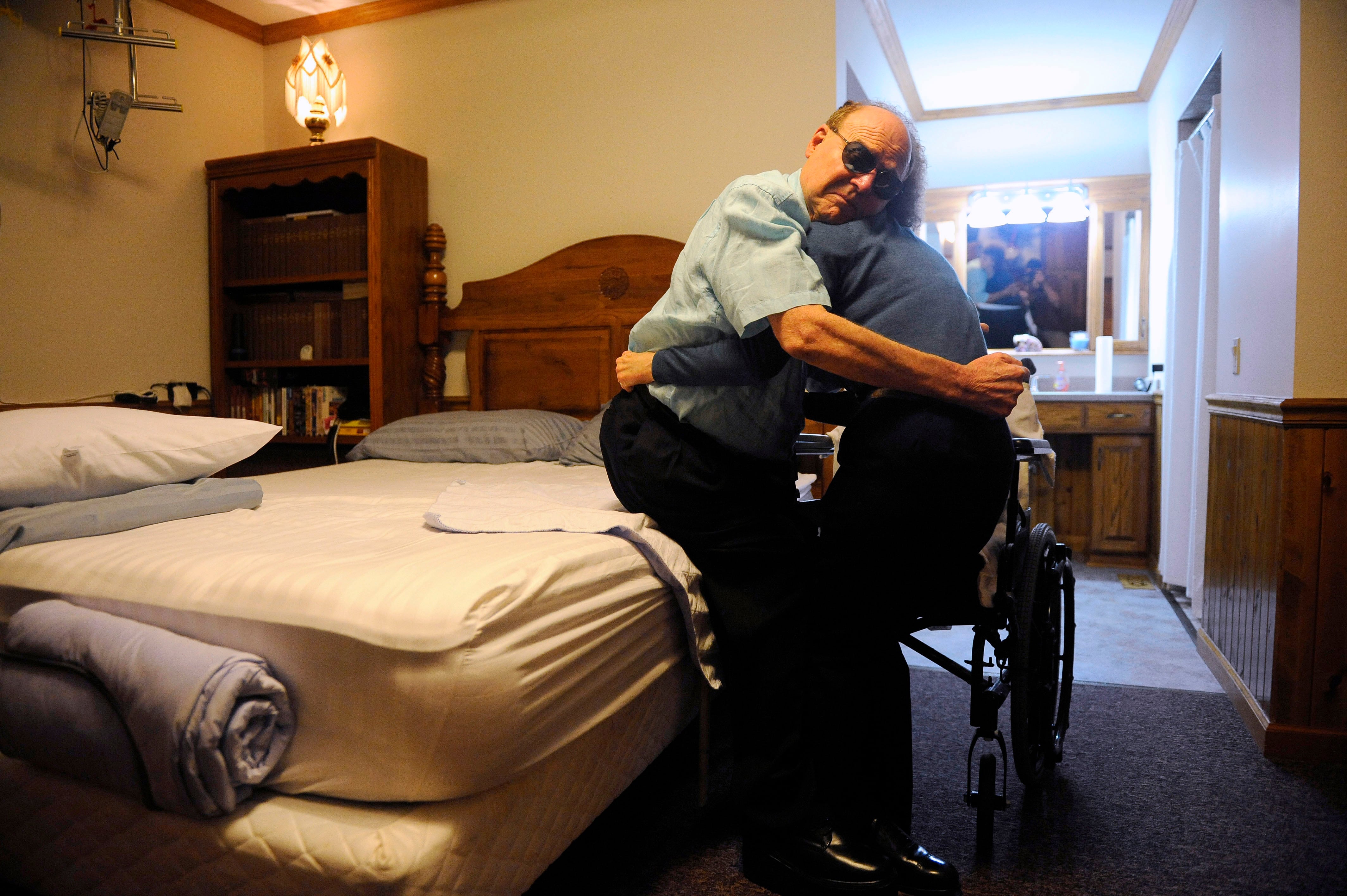Since suffering traumatic brain injury in an explosion in Iraq in 2007, Army veteran Brad Blazek has had trouble remembering when to feed himself, when to take his medications, and sometimes even who he is married to.
So it came as a shock to Terri, his wife and full-time caretaker, when she received word from the Department of Veterans Affairs last fall that they were being dropped from the department’s caregiver program because Brad no longer needed around-the-clock help.
“He has tried to cook in the past, but he burns himself because he forgets to protect himself and use potholders,” she said. “So we don’t do that anymore. And there’s the possibility of him leaving on the stove, or the gas. It’s not worth those chances.
“So when [VA] told me that he doesn’t qualify for continuous care, I don’t know. It just didn’t make any sense.”
RELATED

The Blazeks are among numerous “legacy” participants of the Program of Comprehensive Assistance for Family Caregivers whose cases are currently being reviewed as officials work to standardize and update the benefit.
VA leaders say those reviews are needed to ensure that all veterans who apply for the program — and its generous monthly stipend — are treated fairly and meet the same criteria for eligibility amid years of changes mandated by Congress.
But outside advocates say the moves are arbitrary and cruel, making families choose between financial hardship or the best care for their injured veterans.
“They have completely lost sight of the purpose of this. There is no question about that,” said Holly Ferrell, executive director for Veteran Warriors, an advocacy group which works with more than 3,500 caregivers in the program.
“And the result comes at the expense of the veterans community.”
Program changes
About 33,000 families are currently enrolled in the caregiver program, first established in 2011 as a way to recognize the work — and cost-savings — of family members providing critical care for infirm veterans.
While the program offers a series of legal and support services to families, the most prominent benefit is the monthly caregiver stipend.
Currently, a full-time caregiver tending to a veteran who is “unable to self-sustain in the community” can receive the full monthly stipend, while a caretaker for a vet with lesser but still life-altering limitations can receive a partial payment.
The totals vary based on where veterans live, but generally hover about $3,000 a month for the full Level 2 stipend and $1,800 for the partial Level 1 stipend.
Initially the program was open only to post-9/11 veterans, but in 2018 Congress approved expansion to other generations as well. Individuals who served before May 1975 were admitted starting in fall 2020, and all remaining veterans will be eligible starting this fall.
Two years ago, when the Vietnam-era veterans were admitted to the program, VA officials announced changes to eligibility criteria focused on whether veterans can perform “activities of daily living.”
Department leaders said the changes were forced by Congress under the law. Veteran Warriors and the National Veterans Legal Service Program have sued, saying VA officials raised the eligibility standards arbitrarily and ignored lawmakers’ intent.
Last fall, program administrators announced a full review of all 19,800 “legacy” participants — the post-9/11 veterans who entered the program before October 2020 — to ensure they met the program’s new eligibility criteria.
RELATED

At the time, Colleen Richardson, executive director of the PCAFC, said she expected about one-third of the group to be dropped from the program. Officials this week would not say how many individuals have been told they are being processed out. Ferrell said her group alone is working with several hundred families.
As concerns about the new round of reviews mounted, VA pledged that all current program participants would receive their stipends through 2022, even if they were deemed ineligible. Richardson said that has been extended to March 2023, because of delays with some of the reviews.
That means no families will see their financial support cut off for another year.
“This is a hard process,” she said. “It is hard for our post-9/11 veterans. It is hard for our staff too. Some of these families have been in the program for many, many years.”
She emphasized that families do have appeals options if they are kicked out of the program, and officials expect to process those cases as quickly as possible in coming months.
“If we got it wrong, they have expanded review and appeals options now. And this doesn’t mean they won’t be eligible again in the future. Of course we want to encourage them to reapply should they feel that they meet that criteria again later on.”

Caregiver confusion
But families like the Blazeks said they can’t reapply for the program again in the future if they don’t understand why they were dropped in the first place.
“Shortly after he got hurt, the doctors told me that Brad would need someone to take care of him for the rest of his life,” said Terri, who is also an Army veteran. “At the time, I didn’t really understand what that meant.
“Brad is very intelligent, and he has great coping skills, so some days he can look fine. But he’ll always have this traumatic brain injury and memory loss. He can’t remember what medication he is on or when he should take it. A lot of my day is spent just managing that.”
The Blazeks live in Georgia and have been receiving the VA caregiver stipend for about a decade. Terri works part time, usually after her husband and children go to sleep, but the salary isn’t enough to make up for the $30,000-plus the family stands to lose.
Department handouts explaining the Activity of Daily Living requirements specify that to qualify, veterans must “require personal care services each time he or she completes one or more of the listed activities.”
They include getting dressed, bathing, grooming, eating, walking up stairs and using a toilet. Officials specify that “requiring assistance with [a task] only some of the time does not meet the definition of an ‘inability to perform,’” needed to qualify for eligibility.
Glendell Murray has been a full-time caregiver for her husband, Rayshawn, since he was seriously injured in a weight room accident aboard a ship in 2016.
Before he suffered a brain injury, Rayshawn was outgoing and energetic, serving as the ship’s DJ for parties and always talking with other sailors.
“Now he doesn’t like socializing,” his wife said. “When he’s talking, he can’t stay on topic. His cognitive function has gotten better over the years, but it’s still bad. I can’t ever leave him alone in the house, because I don’t know what would happen.”
Some days he can dress or feed himself, Glendell said. Other days he gets confused or upset. She relies on her teenage sons to watch him when she runs routine errands around town.
The Murrays were accepted into the caregiver program in early 2020 but informed last fall that they would be removed because Rayshawn no longer met the criteria for eligibility.
“We had two assessments done over video and before I knew it we were told we were out of the program,” she said. “It feels like they’re just trying to push people out of it, and I don’t know why.
“It all feels rushed. They didn’t even contact our health care providers to get their opinions.”

Unfair standards
VA officials have acknowledged shortcomings in communicating with families and outside advocates about how the process works and why certain decisions were made. Richardson said officials are looking at revamping letters to families to better explain the reasons why they no longer qualify and what their appeal options are.
But Ferrell and other advocates say even if caregivers better understood the reasons, they still wouldn’t be fair.
A petition to the department filed last month by 22 veterans organizations (including Vietnam Veterans of America, the Military Order of the Purple Heart and the Independence Fund) stated that the new wording regarding daily living activities is “too narrow to properly evaluate a veteran’s disability and symptoms, and may result in veterans being unfairly and unnecessarily deemed ineligible” for the program.
They argue that a veteran who fails at the everyday tasks most of the time — but not “each time,” as outlined in the criteria — needs a caregiver’s help.
“The current language of the regulation assumes the disabled veterans are some binary automatons, either fully capable of completing [daily tasks] or completely incapable, with no allowance for the variation, aggravation, and progression of a service-connected disability that is at the heart of the disability rating system,” the groups stated.
Ferrell said her group is feilding 40 new cases a week from caregivers upset over the changes and worried about their future finances. Many complain that the VA documentation of their veterans’ injuries doesn’t match what is actually happening in their homes.
“We’re seeing statements like, ‘the veteran doesn’t require assistance in this area anymore,’” she said. “And so if that’s wrong, what chance do they have to win an appeal?”
Timothy Jobin, deputy director of the VA Caregiver Support Program, insisted that officials are taking care to make sure their assessments are accurate and fair for all of the families.
“These are long, lengthy interviews so that we do get it right,” he said. “We have another team of clinicians that reviews that documentation, and then we also have another team to make sure that documentation is correct … We’re working to get the answers as accurate as we possibly can.”
Last month, in a press conference with reporters, VA Secretary Denis McDonough promised leadership would take a closer look at the caregiver reviews to ensure the process was running smoothly and ways to calm some of the concerns already surfacing among families.
“We work for the caregivers, we work for the veterans,” he said. “We want to make sure that they’re getting the information they need and the clarity they need about why we’re making the decisions we’re making.”
Terri Blazek said that nothing is clear about her family’s future right now. She is appealing the decision to drop her from the program, but is not optimistic about its potential to work.
“When the stipend goes away, we’re gonna have to just try to tighten down our budget and make things work,” she said. “It’s not a situation where I can just run out and get a full-time job and leave him to fend for himself.
“And it’s not just us. I can’t even count how many caregivers I’ve heard from about the stress that this has caused for their veterans and themselves, trying to plan for when the money goes away. They just don’t seem to understand how many lives they could ruin with this.”
Leo covers Congress, Veterans Affairs and the White House for Military Times. He has covered Washington, D.C. since 2004, focusing on military personnel and veterans policies. His work has earned numerous honors, including a 2009 Polk award, a 2010 National Headliner Award, the IAVA Leadership in Journalism award and the VFW News Media award.



